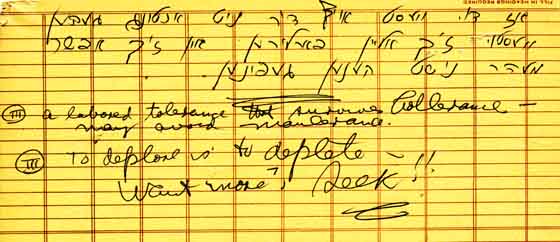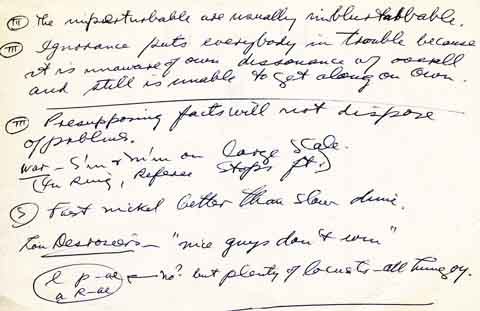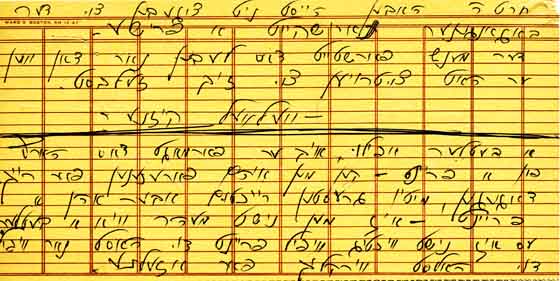Max’s Sayings

| Max’s Road Max’s Sayings |
|
Dearest to Max Gass’s heart of all his creative endeavors were his sayings. Max loved sayings. He collected them, and he spent a lifetime writing and refining his own original sayings. Some he wrote in English, some in Yiddish, his first language. After his death his son Paul found boxes of Max Gass's sayings, written in notebooks, on napkins and envelopes, on the margins of magazine clippings and the backs of programs. The writing was often done spontaneously at prayer services, while reading an article, talking to friends or listening to a speaker.
On a slip of paper found among a thousand others, he mused about this lifetime pursuit:
“Why do I write sayings? Merely to satisfy vanity? Possibly, but not really. For entertainment? To a degree, but not altogether. To cast light on human errors and foibles--preventing them from becoming excesses. To help make known what should be more readily known. To set down what is worthwhile. Although there is nothing new under the sun, and sayings repeated long enough sound like clichés, new meanings can be found with sufficient patience, new approaches that can cast light on the pathways of life.”
Max Gass identified his own original English sayings with the initial "M". A series of sayings on business which he identified with the initial "S" are doubtless bits of wisdom he overheard from his father, Samuel Gass. Of the many sayings he wrote down in Hebrew script some are certainly his original work. Just as certainly some are Yiddish sayings he overheard, or are based on scriptural texts from his Judaic studies.
 |
|
 |
|
|
A small sampling of the sayings that Max collected over a lifetime |
|
 |
 |
Max titled his collection at different times, Facts, Opinions and Foibles, Face, Faith and Foible, and (his favorite) Plax Du Max. He made many attempts to market his sayings—on aluminum frames, wooden plaques, greeting cards, the backs of photo prints, and with tea bags. He tried to interest Xerox, Hallmark Cards, Polaroid, Salada Foods, Celestial Seasonings, and other corporations in his sayings without success.
Click here to read about Max Gass's Yiddish and Hebrew
Sayings.
|
|
|
|
|
In 2004, fifteen years after Max’s death, a sampling of Max’s sayings and
an analysis of his writing was published by Mikhail Khazin in The Jewish
Advocate (Boston), The Yiddish Forverts (New York) and in two
Russian-language magazines, Contact (Boston) and Vestnik
(Baltimore). |
Max’s Final Years
Neat the end of his life Max worked part-time in his son Paul's company, Eaton Financial. These were years in which he had the opportunity to use the knowledge and wisdom accumulated over a lifetime. John Colton, Senior Vice President at Eaton, remembered Max well:
“I got to know Max when he came here. It must have been three years... He was here two or three days a week. Max was primarily an investment advisor. His responsibilities were to help manage the pension fund, the various investments that the Company had—mostly stocks and bonds.
“Instead of always focusing on the stock market where you can spend hours analyzing numbers, he had a broader perspective, which made him much more successful in looking at investments. He seemed to have a longer horizon, and sort of a larger scope than most people. That was very helpful to us because we're a very young, very fast-growing company. And in that environment you kind of get lost. His perspective on a longer timeframe gave us a tremendous sense of balance.
“I saw the results. The pension plans and the profit-sharing plans did very well in those years. He really contributed while he was here. It was good for both sides.
“Every time something happened—nuclear disaster, the stock market going down, rising interest rates—he always seemed to be able to look beyond that sort of short-term negative. That's very comforting. I think that came from inside. This was a company which was doubling in size every year, which had gone from thirty employees to—well we're four hundred employees today—in less than four years. So in this explosion of growth, and people coming and going, he seemed to have a very calm approach to things. And he always did it with a smile.
“He was a fascinating man. For someone who essentially had the job of analyzing investments—which meant he didn't work with others, because he was the only one who did it here—he still got to know everybody. He took a genuine interest in the people that were here. To him it didn't make any difference what you did. You were an Eaton employee and it didn't make any difference whether you were a Senior Vice President or a part-time clerical.
“We were all extremely fond of him too. He had a very warm quality. Genuine interest in people and a way of always appearing to be happy and pleased with what was going on with both the people as well as the company.
“I was at the time the oldest employee. I would have been fifty-two or fifty-three. The average employee was probably just twenty-seven or twenty-eight. So he was the only really mature person here. And he really enjoyed the younger people. Unlike a lot of older people he never criticized, never, whether it was short skirts or loud music or whatever was going on. Sometimes you'd find him in deep conversation with one of the younger people here. Just interested in what they were doing, what they were thinking.
“In all the times that we talked he never talked about the past. He always talked about the future. But you never could talk to him about something like Is the stock market going to go up or down? He wanted to talk about why, and what that means today as you look out into the future. Whether it goes up or down really was not as important as the way things happen.
“He was always humorous. If you think of a word picture of him you have to include the word smile. And you'd always see people smiling around him.”
|
|
|
Max Gass in his later years |